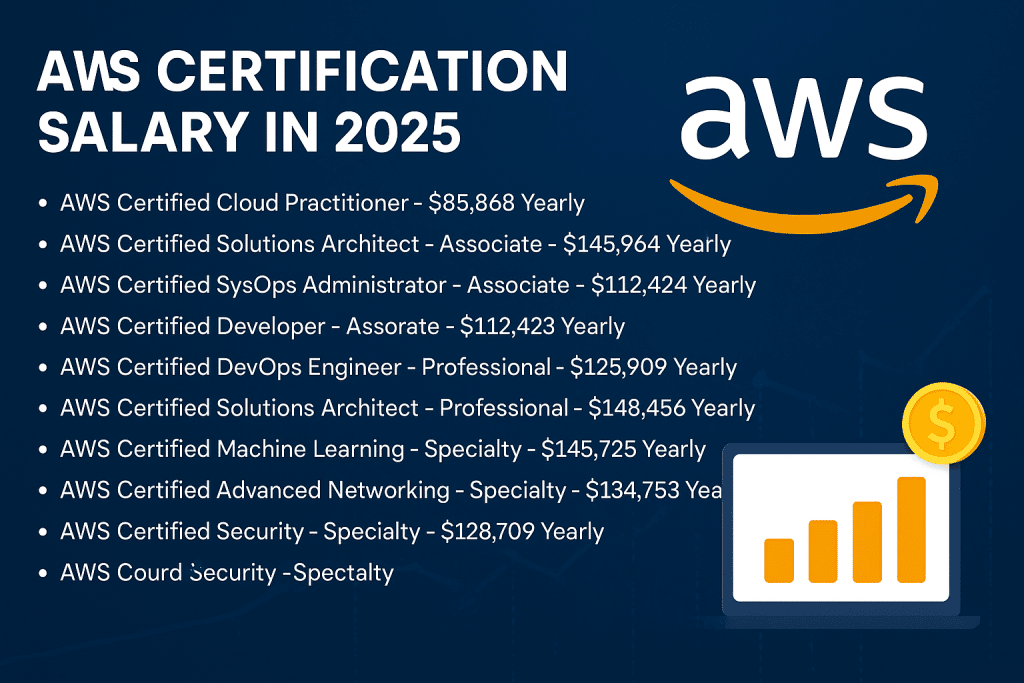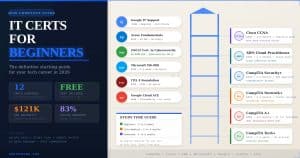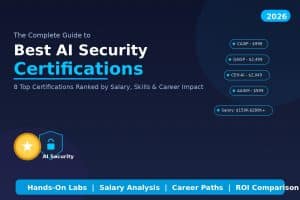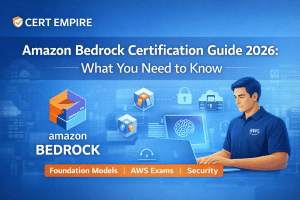Cloud technology continues to reshape how organizations run, scale, and compete. As more companies adopt cloud computing and integrate services via the AWS platform, the demand for certified professionals who can manage, optimize, and secure these environments is surging. For many IT professionals, earning AWS certifications is a strategic move – not just for credibility, but for higher compensation.
In this post, you’ll see real-world earnings of AWS certified roles, compare how much top credentials pay, and learn how to position yourself for strong career benefits. Whether you’re starting with AWS Certified Cloud Practitioner or targeting advanced specialty tracks like AWS Certified DevOps Engineer or AWS Certified Machine Learning, this breakdown will guide your path.
Understanding AWS Certification and the Cloud Market
Before diving into numbers, let’s set the context.
Why AWS Certifications Matter
AWS has been a pioneer in cloud computing, leading in IaaS and offering a rich set of cloud services across global infrastructure. Organizations rely on AWS for compute, storage, analytics, networking, security, and more. That means AWS certified professionals are in high demand.
Certifications validate essential knowledge of cloud architecture, access management, services AWS, and best practices like the AWS Well-Architected Framework. They also help differentiate you in a competitive talent pool.
Because AWS offers role-based credentials (Foundational, Associate, Professional, Specialty), professionals can progressively deepen their skills in areas like cloud security, devops engineer, database, and advanced networking.
Market Trends in 2026
- The ongoing shift to cloud means more jobs needing cloud skills.
- As companies expand in sectors like finance, healthcare, and e-commerce, AWS roles often command premium pay.
- Certified professionals often report higher pay (10%–25% more) compared to non-certified peers.
- In the U.S., “AWS certification salary” averages are trending upward. ZipRecruiter lists an average annual compensation of around $112,422 for roles tied to AWS certification.
- Entry-level cloud roles with certification (e.g. AWS cloud practitioner salary) are also rising: for example, the average salary for an AWS cloud practitioner in the U.S. is listed as $85,866 by Coursera.
Given these dynamics, it’s useful to see how salary scales across certification levels.
Types of AWS Certifications and Their Career Impact
AWS’s certification structure divides in levels. Each step offers not just skills, but potential earnings uplift.
Foundational Level – AWS Certified Cloud Practitioner
The AWS Certified Cloud Practitioner is designed for newcomers to cloud roles. It covers core AWS services, billing, cloud security basics, and general architecture principles.
Because many professionals begin here, it may not command the highest earnings – but it opens doors.
- Reported average salary: $85,866 in the U.S. for cloud practitioners.
- Many go on to roles like cloud engineer or cloud developer, increasing earning potential.
- The certification helps validate your baseline cloud skills and familiarity with AWS Cloud.
Associate Level – Building Strong AWS Foundations
At the Associate level, the AWS certifications begin to unlock serious income potential. These roles typically require some AWS or IT experience.
AWS Certified Solutions Architect – Associate
One of the most popular certifications. Solutions architects design and deploy scalable systems.
- Skilled architects often command salaries in the $120,000–$145,000+ range in the U.S.
- The credential is foundational for stepping into higher roles like AWS Cloud Architect or Certified Solutions Architect Professional.
AWS Certified Developer – Associate
For professionals who build and maintain code on AWS.
- Developers with this certification see salaries typically in the $110,000–$130,000 range.
AWS Certified SysOps Administrator – Associate
SysOps focuses on operations, monitoring, and deployment on AWS.
- Many listings show averages around $114,000+ in the U.S.
These three certifications – Solutions Architect, Developer, and SysOps – often form the backbone of AWS roles. When you accumulate multiple associate-level credentials, your leverage for salary negotiation increases.
Professional & Specialty Levels – Maximum Leverage in AWS Careers
As you move beyond the Associate tier, AWS offers Professional and Specialty certifications, each tailored toward deeper knowledge, leadership, or niche domains. These carry the most potential for salary jumps.
Professional Level – Leadership and Advanced Roles
Certified Solutions Architect – Professional
This is the escalation from Solutions Architect Associate. It tests complex systems design across multiple services, high availability, cost optimization, and performance.
- Many AWS certified solutions architect professional roles see salaries between $140,000–$170,000+ in the U.S. based on seniority and region.
- Those who already hold the Associate credential often leverage it to negotiate even higher wages as cloud architects.
Certified DevOps Engineer – Professional
This role emphasizes automation, CI/CD pipelines, infrastructure as code, monitoring, and security.
- Salaries often range from $130,000–$160,000+ or more, depending on company size and complexity.
- Because DevOps is integral to cloud operations, this credential bridges engineering with operational leadership.
Specialty Certifications – Deep Domain Expertise
Specialty certifications demonstrate mastery in critical areas of AWS. These are ideal for professionals focusing in niche fields like security, networking, or machine learning.
- AWS Certified Security – Specialty: Experts in identity, encryption, governance, and compliance. Salaries can range widely depending on experience and sector.
- AWS Certified Advanced Networking – Specialty (or certified advanced networking specialty): Focuses on complex networking architectures, hybrid connectivity, and performance.
- AWS Certified Machine Learning – Specialty: Machine learning is a high-growth domain; ML specialists often command premium compensation.
- AWS Certified Database and aws certified niche roles often see strong salary edges because fewer professionals hold them.
Because fewer professionals pursue specialty tracks, the supply-demand imbalance often gives these roles an extra boost. Organizations pay for depth – not just breadth.
Salary Tables – Top Paying AWS Certifications in 2026
Here’s a snapshot of approximate U.S. salary ranges by certification track. Keep in mind that actual pay depends on region, experience, role, and employer.
| Certification / Role | Approx. Salary Range (USD) |
|---|---|
| AWS Certified Cloud Practitioner | ~$85,000–$105,000 |
| Solutions Architect – Associate | ~$120,000–$145,000 |
| Developer – Associate | ~$110,000–$130,000 |
| SysOps Administrator – Associate | ~$110,000–$125,000 |
| Solutions Architect – Professional | ~$140,000–$170,000+ |
| DevOps Engineer – Professional | ~$130,000–$160,000+ |
| Security – Specialty | ~$140,000–$165,000+ |
| Advanced Networking – Specialty | ~$135,000–$155,000+ |
| Machine Learning – Specialty | ~$145,000–$175,000+ |
These figures are illustrative, drawn from industry reports and aggregate data sources as of 2026.
In many cases, AWS certified professionals holding multiple credentials (e.g. Solutions Architect + DevOps + Specialty) command premium packages well above the base ranges.
Factors That Influence AWS Certification Salary
Experience & Role Level
Years in hands-on cloud roles often matter as much as certifications. A senior architect with 5–10 years may earn significantly more than a mid-level associate.
Multiple Certifications
Each additional credential, especially from specialty tracks, adds to your value. Employers reward certification holders who can solve cross-domain problems.
Organization Size & Industry
Larger enterprises or core tech firms (e.g. AWS, Google Cloud, finance, healthcare) often pay more for equivalent roles compared to small companies.
Geography & Remote Work
Location heavily influences salary. San Francisco, New York, Seattle, or major remote-friendly companies tend to pay more. But with remote work, you can often bridge gaps.
Skill Set Synergy
Complementary skills, like cloud security, data analytics, machine learning, or network security, boost your earning potential in roles that handle cross-cutting concerns.
Market Demand & Cloud Adoption
As more companies shift workloads to the cloud, demand for AWS roles remains high. The pace of cloud adoption and expansion of multi-cloud strategies also drives demand for certified professionals.
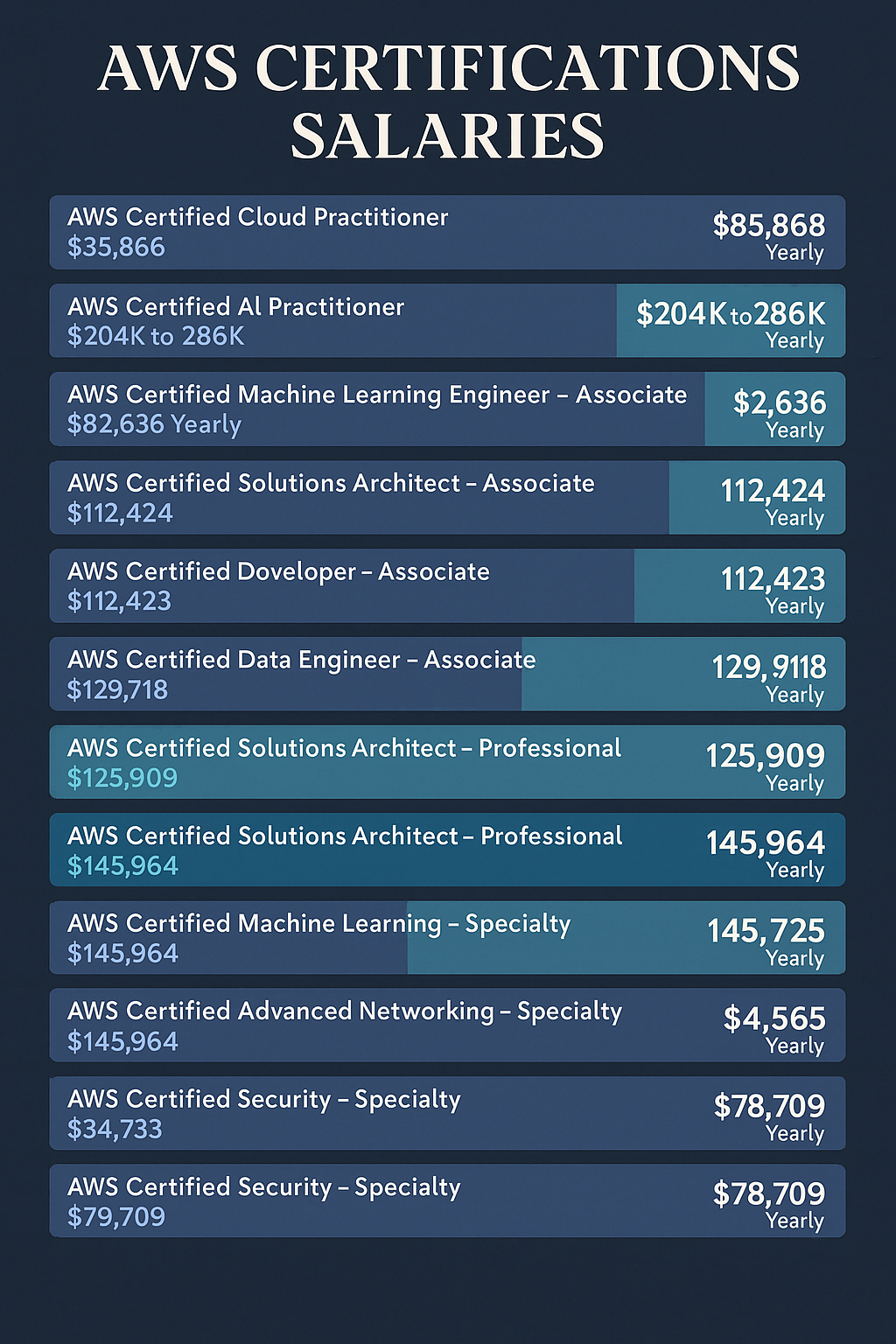
Conclusion – Maximizing Your AWS Earning Potential
AWS certifications are more than badges; they’re strategic assets. From the foundational level to specialty credentials, each step reflects increasing depth in cloud architecture, cloud operations, and cloud security.
By aligning your credentials with in-demand roles (e.g. solutions architect, devops engineer, security specialist, machine learning engineer), and combining them with experience and adjacent skills, you position yourself to earn significantly more and gain greater career flexibility.
Ready to take the next step? Explore Cert Empire’s AWS certification exams and start prepping with real exam questions, practice tests, and validated study resources to confidently reach your highest earning potential.
FAQS
1. What is AWS Certification, and why is it important for cloud computing careers?
An AWS certification is a professional credential offered by Amazon Web Services that validates your cloud skills and understanding of cloud computing principles. By earning one or more AWS certifications, you prove your ability to design secure cloud architecture, implement access management, and manage cloud operations using core AWS services. For IT professionals and certified professionals, this recognition not only opens doors to high-demand AWS jobs but also demonstrates continuous learning in the fast-growing cloud industry.
2. Which AWS certifications are in the highest demand and pay the best salary?
Top paying credentials include AWS Certified Solutions Architect – Professional, AWS Certified DevOps Engineer – Professional, and AWS Certified Machine Learning – Specialty. These advanced and specialty certifications require advanced knowledge of the AWS platform and deep cloud security expertise. They consistently rank among the top paying AWS certifications globally, offering salaries that exceed many other cloud certifications and providing exceptional long-term career benefits.
3. How much can you earn with the AWS Certified Cloud Practitioner credential?
The AWS Certified Cloud Practitioner is an ideal starting point for newcomers to cloud computing. It confirms a grasp of AWS fundamentals, cloud services, and basic cloud management. According to market data, the typical AWS cloud practitioner salary in the United States ranges from $85,000 to $105,000 annually. Many professionals later advance to roles like cloud engineer, cloud developer, or solutions architect associate, where salaries and responsibilities grow significantly.
4. What does an AWS Certified Solutions Architect do?
A solutions architect with an AWS Certified Solutions Architect credential is responsible for designing scalable, reliable cloud architecture using a variety of AWS services. They ensure that the system meets business needs, optimizes cost, and follows the AWS Well-Architected Framework. Many begin with certified solutions architect associate or solutions architect associate exams and later move to certified solutions architect professional, unlocking salaries often well above $140,000.
5. How does the AWS Certified DevOps Engineer certification boost a career?
The AWS Certified DevOps Engineer – Professional credential validates expertise in CI/CD, automation, and managing AWS environments. These DevOps engineer roles often involve sophisticated cloud operations and access management, which makes them integral to modern AWS systems. Professionals holding this certified DevOps engineer certification frequently earn $130,000 to $160,000+, especially when combined with solid aws training and hands-on project experience.
6. What are AWS Specialty Certifications, and who should pursue them?
Specialty certifications (each a specialty certification in its own right) cover advanced domains like AWS Certified Security – Specialty, AWS Certified Advanced Networking – Specialty, AWS Certified Machine Learning – Specialty, and AWS Certified Database – Specialty. These credentials validate advanced knowledge in focused areas such as cloud security, data analytics, and machine learning. They are ideal for AWS certified professionals seeking to become subject-matter experts and command some of the highest salaries in the cloud industry.
7. How do AWS certification exams prepare professionals for real jobs?
Every AWS certification exam is designed around actual job roles, from cloud practitioner to cloud architect and cloud developer. The exams test not only conceptual AWS fundamentals but also the ability to implement AWS solutions and use AWS services in real projects. Preparing for these exams with quality AWS training, exam questions, and practice exams helps certification holders transition smoothly into day-to-day tasks like deploying Amazon Elastic Compute Cloud instances or strengthening network security.
8. Are AWS certifications still worth it in 2026’s competitive cloud market?
Absolutely. As more companies adopt cloud technology and invest in cloud adoption, the need for AWS certified talent continues to grow. Certifications serve as proof that your cloud skills are current and that you can work effectively across multiple AWS services and AWS solutions. This not only increases job security but also makes you more attractive to top technology providers competing in the global cloud market, including those that also use Google Cloud Platform.
9. How do I prepare for AWS certification exams and maintain my credentials?
Start with structured AWS training and official guides, then reinforce learning with practice exams and associate certification or professional certification study paths. Focus on key topics such as cloud security, access management, and cloud operations. After certification, continue to refresh your AWS skills and track updated exam content to keep your status current, a crucial step for maintaining ongoing career benefits and achieving higher earnings.
10. Do AWS certifications guarantee higher salaries and better jobs?
While no credential guarantees a specific income, holding multiple AWS certifications dramatically improves your prospects. Employers know these certification programs require rigorous exams and proven AWS expertise, so certified professionals typically earn more than peers without credentials. High-level roles like AWS cloud architect, cloud engineer, and senior devops engineer often favor candidates with several certifications, from associate certification to certified advanced networking specialty, leading to long-term job security and consistent salary growth.
Article Sources
- Skillsoft IT Skills and Salary Report 2026 – Annual global report on certifications and compensation trends.
https://www.skillsoft.com/resources/it-skills-and-salary-report - ZipRecruiter AWS Salary Data – Up-to-date U.S. salary insights for roles such as AWS Cloud Practitioner, Solutions Architect, Developer, and more.
https://www.ziprecruiter.com/Salaries/Aws-Certification-Salary - Payscale AWS Salary Research 2026 – Market analysis of median and top salaries for AWS-related positions across industries and regions.
https://www.payscale.com/research/US/Certification=Amazon_Web_Services_(AWS) - Glassdoor Cloud Careers Reports – Verified compensation ranges and hiring trends for cloud engineers, DevOps engineers, and cloud architects.
https://www.glassdoor.com/Salaries/cloud-engineer-salary - AWS Official Certification Pages – Detailed descriptions of all AWS certifications, recommended experience, and exam guides.
https://aws.amazon.com/certification/ - Coursera Career Guides – Average pay and job outlook for AWS Cloud Practitioner and related associate roles.
https://www.coursera.org/articles/aws-cloud-practitioner-salary - HG Insights Cloud Market Data 2026 – Global market share and cloud adoption trends highlighting AWS’s leadership position.
https://explore.hginsights.com/aws-ecosystem-in-2026 - LinkedIn Workforce Reports – Data on rising demand for AWS certified professionals and related cloud skills worldwide.
https://business.linkedin.com/talent-solutions/resources/talent-strategy/linkedin-workforce-report

